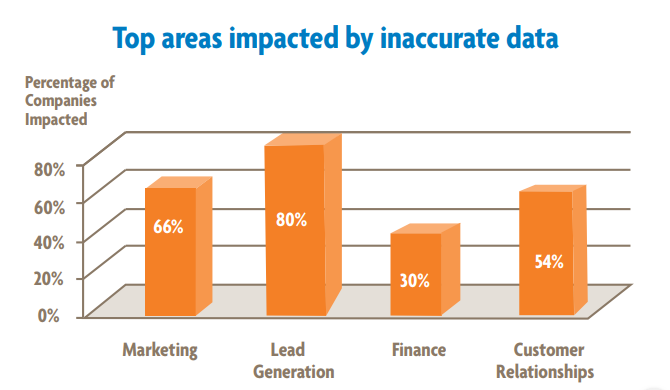Since data-driven marketing is ruling the business space in 2019, one cannot ignore the value of clean data anymore. An incorrect or invalid data will surely harm your company’s credibility as well as revenue to a greater extent. You might have generated leads with the unhygienic database by fluke, but it will not repeat always.
“Dirty data will remain dirty unless you clean it.”
How will dirty data cost your business?
Data decay is natural because of the rapidly evolving B2B landscape. But at the same time, it will cost your organization more than expected if you do not take proper action against it. We collected data from several sources to prove you this point. Take a look at it.
The outcome of relying on the unclean database:
- In the U.S, the decisions because of dirty data cost the economy approximately 3.1 trillion dollars every year. (Source: IBM)
- Unclean data directly impacts the bottom line of about 88% of American companies. (Source: Experian)
- 33% of company projects often flop because of weak data. (Source: Springer Link)
A recent study by DemandGen has shown the effect of unclean data on different areas of business.

Source: DemandGen
Hope you are convinced now! So, what is the next step? Once you realize owning outdated or false data is useless for your business, take the help of data hygiene services to optimize it and make it perform better.
How to keep your database clean?
There is a no significant asset for any company other than a clean B2B database. So, whenever your database becomes cluttered or outdated, invest some time as well as effort to clean the mess. There are many ways to do it. But to save your time, we listed three must-follow steps here. Take a close look at them and understand it in-depth to prevent losing time, money, and other resources because of dirty data.
1. Correct Knowledge of Marketing Environment
Stop assuming the buyer’s behavior or their likes. It causes accumulation of a large number of irrelevant data in your database. And, thereby results in the development or production of wrong products. There it is – you will waste your time, money, and effort because of unclean data. Besides, it affects your company reputation noticeably.
New Coke is a classic example of this problem. The company came up with the new taste which resulted in disaster. Their only mistake was – they did not understand their customers fully.
So, to avoid such cases, you must carefully understand your marketing environment. Spend time on researching your target market and analyze the data you own.
2. Choose the Right Method to Collect the Data
Once you know your primary goals as well as the marketing scene, you can begin with collecting the data. Firstly, you need to identify the right source of data. There are several vendors online who deliver the authentic data directly to your inbox. Research on such vendors and pick the right one for your business.
You can also collect the data through other means such as-
- Newsletter subscriptions
- Surveys
- Yellow pages
- Business records
- Trade shows
- Direct personal talks
- Local Agencies
- Questionnaires
- Oral Interviews
- And more.
But while collecting, you must ensure that the data source is authentic and real. Otherwise, all your effort will be of waste!
After collecting the data, you must enforce a standard naming convention throughout your database. It reduces the number of redundancy and also speeds up the analysis process.
3. Examine the Data for Errors and Work on It
Now you know about your marketing environment and also have sufficient data with you. So, the final step is to examine it for any errors or outdated data. No matter how dependable is your data source; you may find some irrelevant or missing information in it. Hence take a quick look at your database and fix the inaccuracies in it.
Proactively scrub the database to remove all the errors and duplicate data. According to experts, quarterly scrubbing is required for large databases with 100,000 or more leads, while semi-annual cleansing is sufficient for small databases. Since it is tiresome to go through each record, you can take the help of tools that automatically de-duplicates and notifies you of any errors or missing data.
You can also prune the inactive and junk contacts in your B2B database. Garbage information will affect the performance of your lead generation strategy. By deleting all the dirty records, you can solely focus on targets who are genuinely interested in your brand.
You can carry out this cleaning process on chunks or information system as a whole. Be it any method; make data hygiene as your primary concern.
There is no industry on the globe without data quality problem. But when you find such an issue, treat it at the earliest. It can save a lot of money and efforts spent on irrelevant data.
“Always give higher priority to data hygiene activities.”
Key Takeaways about Hygienic Data
Will you still take data cleanliness for granted? It will cost your marketing effort as well as budget drastically if you do so. Bad data will not only waste your time but also makes you take the wrong strategic decisions. Hence if you are drowning in dirty data, it is time to wake up. Invest some of your marketing budget on right data hygiene tools and services to save yourself from marketing gaffes in 2019!

